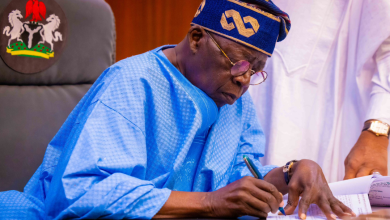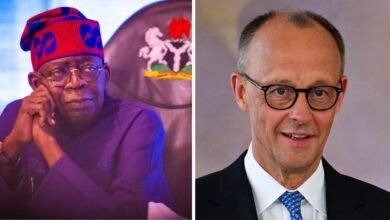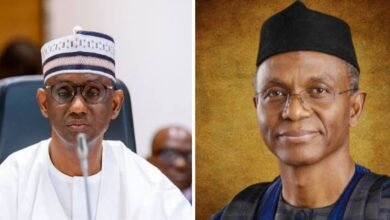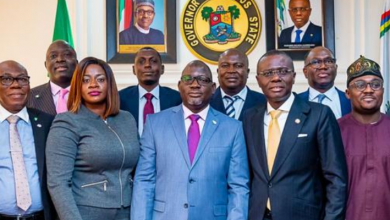News
Taking Lagos Out Of The Doldrums

By Remi Adelowo
The success story of Lagos State is a classic case study of what having a vision and running with it can achieve in the trajectory of an individual, state and country.
Pre-1999, Lagos though a former Federal Capital Territory, had practically lost its trappings as a centre of excellence and glamour. It was a state beset with multifarious challenges that were Herculean and seemingly insurmountable.
The educational sector was in comatose. The health sector was any different. The transportation sector was ancient and archaic. Infrastructure was in an appalling state. Worse still, the civil service, the engine room expected to drive government policies was literally on a downward spiral.
From one successive government to another, these challenges had defied all solutions. Lagos, for many, was no better than a jungle fit for the sub-human.
From May 29, 1999, the story soon began to change for good. Thanks to one man, Asiwaju Bola Ahmed Tinubu, a respected pro-democracy activist, former Mobil Oil executive and former Senator in the short-lived Third Republic.
What he lacks in frame, Tinubu more than makes for it in his sharp intellect and audacity to dare the odds. His vision and ideas to turnaround the trajectory of Lagos were bold and grandiose.
Once he was declared winner of the governorship election,Tinubu set to work. He was, arguably, the first and only governor-elect who set up a Transition Committee to fashion out a blueprint for his administration.
The Committee had various sub-committees manned by successful and accomplished professionals in various fields to proffer short, medium and long term solutions to the myriad of challenges confronting Lagos State, from Traffic Management, Health and Education, Sports, Revenue Generation, Road Infrastructure, to mention but a few.
Few weeks before his inauguration as governor, Tinubu already had a 32-year blueprint that guided the modus operandi of his administration, and successive governments in the State. To assist him achieve his vision, he constituted a Cabinet that is still rated the best ever in the history of Lagos. From the current Vice President, Prof. Yemi Osinbajo in charge of the Ministry of Justice, to Olawale Edun (Finance), Olayemi Cardoso (Budget and Economic Planning), Dele Alake (Information and Strategy) amongst several others. The Lagos cabinet was an assemblage of the best of the best.
In no distant time, the results began to manifest. From one ground breaking initiative and policy to the other, the Tinubu-led government from 1999 to 2007 recorded several firsts in the country. It was the first government in the country that introduced an agency specifically charged with the responsibility of managing the chaotic traffic situation known as the Lagos State Traffic Management Agency (LASTMA).This initiative has been copied by many states across the country.
In finding a holistic solution to the transportation crisis being faced by the state, Tinubu’s government established LAMATA, which drew the blueprint to construct five light rail lines in the five divisions of the state. Two of such, the Red and Blue Lines are currently on the verge of completion. The construction of the Green Line,of which design is ready, is the next project in focus and would run across the Marina-Lekki corridor.
In strict adherence to the actualization of the transportation masterplan, the Lagos State Waterways Authority was established by Tinubu’s successor, Mr. Babatunde Raji Fashola, the current Minister of Works and Housing. This is to take advantage of the aquatic endowment of the state to further make commuting by Lagosians on the sea easier and faster.
In the education sector, the first bold step undertaken by the Tinubu government was the return of mission, faith-based schools to their original owners. That policy has also been copied by many state governments.
In addition, several new millennial schools were built, while several old schools were rehabilitated and reconstructed. Reforms were also carried out in school management and administration. Teachers who hitherto were not given their pride of place soon began to smile. Like it obtains in the Civil Service, Teachers with outstanding record and long service for the very first time in the history of the country, rose to the enviable position of Tutor General equivalent to the position of a Permanent Secretary. It was unprecedented!
To ensure no child was left behind in acquiring basic education, the Tinubu-led administration declared free primary and secondary education irrespective of a child’s state of origin. And for the first time ever, the Tinubu government paid the WAEC fees of all SS 3 public secondary school students. Even more commendably, thousands of teachers were recruited to fill the manpower gap in public schools.
The health sector was not left out. New General Hospitals, in Igando, Ikorodu, Orile Agege to mention but a few were built, while existing ones were rehabilitated and equipped to cope with the ever expanding health needs of Lagosians.
Furthermore, mobile health clinics were set up to dispense healthcare to Lagosians, particularly accident victims. Under Tinubu, the Lagos State University Teaching Hospital (LUTH) received a massive facelift that has stood the test of time.
In Housing, the Tinubu-led government constructed several low and medium term housing estates across the length and breadth of the state. From Ifako Ijaye, Agege, Ojokoro, Lagos Island, Lekki amongst others, Tinubu’s footprints in the housing still dot the landscape.
In road infrastructure, the Tinubu-led administration recorded many feats. Major road projects carried out include the famous Kudirat Abiola Way, Oregun, Ojuelegba to Lawanson Road, Adeola Odeku,Adetokubo Ademola, LASU-Iba, Akin Adesola, the consortium of roads within the Marina/Broad Streets CBD, to mention but a few. These roads are still in good shape almost 20 years after they were reconstructed.
But it is in the areas of tax reforms and Internally Generated Revenue (IGR) that Tinubu has displayed his management dexterity the most. This template has been copied by the Federal Government and several states. From a paltry N600 million pre-1999, Tinubu’s government jerked up the revenue of the state to almost 10billion by the time he handed over in 2007. The Lagos IGR today stands at about N40billion, a testimony to the vision and foresight of Tinubu.
It is also to the credit of the Tinubu-led administration that the inherent benefits of the Capital Market via Bonds to fund developmental projects were first discovered and tapped. Both the Central and many states have since keyed into this. Not a few opposition figures thought this was impossible then. But Tinubu’s ingenuity made it possible!
At the core of all of Tinubu’s government policies were to poverty, improve human capital development and, most importantly create jobs. The establishment of agencies such as LASTMA, LAMATA, Lagos State Waste Management Authority (LAWMA), Lagos State Signage and Advertising Agency (LASAA), Lagos State Environmental and Protection Agency (LASEPA), Kick Against indiscipline (KAI) Corps, and Ministries of Housing, Waterfront Development, Office of the Central Business District, creation of new Local Governments to bring development to the grassroots and many others have created hundreds of thousands of jobs and reduced poverty significantly.
Arguably Asiwaju Tinubu’s biggest achievement is his innate gift to identify worthy successors that have kept the glow of achievements in the state aflame from 2007 when his tenure lapsed till date.
Starting from Babatunde Fashola, who took over from Tinubu and redefined governance, to Mr. Akinwunmi Ambode, who left his footprints on the sands of time to the incumbent governor, Mr. Babajide Sanwo-Olu, the fidelity to the masterplan put in place in 1999, but which each of the aforementioned trio have tweaked and improved upon to conform with prevailing realities, is a clear testament to the vision of Asiwaju Bola Tinubu as the greatest politician of this era. That Lagos State is now rated as Africa’s 5th biggest economy did not happen out of the blues.
It is as a result of Asiwaju Tinubu’s incomparable vision and the guts to walk where others fear to tread.




